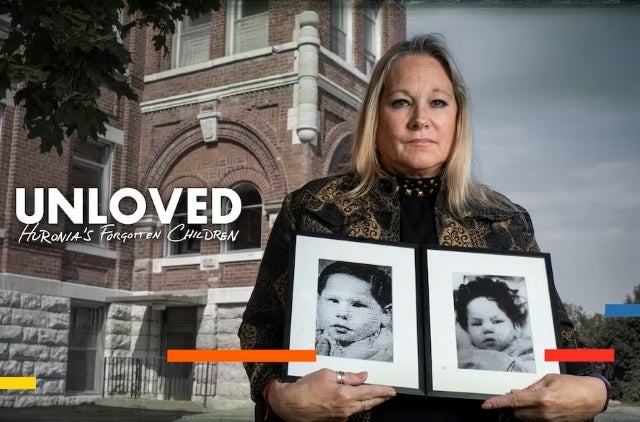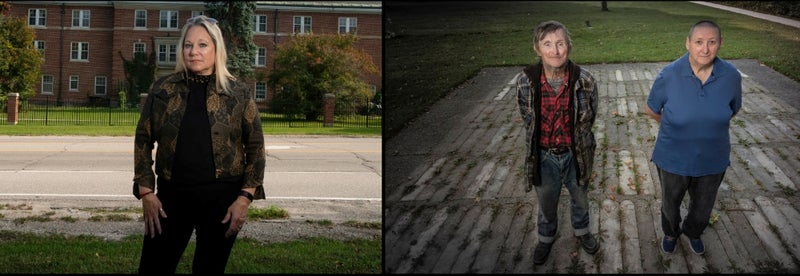Huronia's Forgotten Children - a gripping documentary that tells a sad but true story only now surfacing

When I was sent an advance screener of Unloved: Huronia’s Forgotten Children, I felt that as the editor of Inspirations Newspaper which celebrates diversity that I had a duty to watch it.
This is the sad but true gripping personal story, told by filmmaker Barri Cohen (no relation), that had its world broadcast premiere in Canada on CBC in late January and is now streaming for free on GEM.
Here is the link to view the entire film: https://gem.cbc.ca/media/unloved-huronias-forgotten-children/s01
Here is the link to the trailer: https://vimeo.com/691846191
Unloved: Huronia's Forgotten Children - Trailer from White Pine Pictures.
The film first premiered at Hot Docs Festival (2022) and was a top three Audience Choice winner. It has since received other awards and nominations. A warning to viewers: the film contains disrespectful language and outmoded disability labels that do not reflect the views of the filmmakers or participants.
Filmmaker Cohen went looking for the truth about her half-brothers, Alfred and Louis, who were kept a secret from the rest of the family by her father. In amongst the beautiful region of Orillia, known as the gateway to Muskoka - Ontario’s mega tourist destination - lay a secret for many many decades that only now has surfaced. Known in the19th Century as the Orillia Asylum for Idiots, Huronia embodied a brutalist approach to those who didn’t meet the definition of normal. It was where thousands of children were sent when doctors recommended they be institutionalized.
“We were not people,” one survivor said about how the staff looked at them. “In their eyes, we were animals.”
What the filmmaker discovers is a community of survivors and activists who have sought redress for years of physical, emotional and sexual abuse. In 2013, they received a settlement from the Ontario government on a landmark class action suit. Cohen’s camera was there to record painful memories and chart the survivors’ success in commissioning a Memorial Monument at the Huronia Cemetery to honour those who lived, died, and were unceremoniously buried at Huronia, many in unmarked graves.
The film reminds us of the legacy of discrimination and casual cruelty, where “a world of fear and shame decided who was fully human and who was not,” said Cohen.
In an interview, Cohen told me that she began to work on the film in 2014 and it took her five years to get funding in the form of development money from the CBC. In the meantime, she covered the many initial expenses on her own to get the ball rolling.
Soon after financing fell into place, the COVID-19 pandemic hit and filmmakers like everyone else were given strict new rules on how to operate.
What we see in the final product represents seven years of hard work. It is disturbing, yet at the same time riveting to watch. The plight of these survivors can be applied no doubt to how the intellectually handicapped were treated across the country and probably the globe.
People like class action litigants Patricia Seth and Marie Slark, were admitted to the HRC with their I.Q.s listed on admission forms. Cohen’s brothers were listed on admission documents as “idiots”. Some, like artist Brian Logie were admitted as simply, “a disturbed boy from an unstable home.”
Unloved: Huronia’s Forgotten Children takes us inside the now-empty HRC, where children were once kept in cage-like cribs or punished for minor misdeeds by being locked alone for hours in a lightless boiler room dubbed “the pipe room”. Deep scratches made by small hands are still visible on the room’s door, marking a child’s helplessness and despair.
“My intention with Unloved,” says Cohen, “was to portray a reality that will hopefully resonate with audiences so that they may recognize how much dehumanization, ‘othering,’ and warehousing of people continues to this very day in institutional spaces.” Cohen's intention as well is to call attention to the intergenerational damage that lingers when children are segregated from family and love, rather than receiving full supports within their communities.
“Unloved is the product of trust and conversations, built over these many years of the film’s production,” Cohen continues. “The survivors, and the survivors they speak for, are resilient and brave, and I’m grateful to them and to my family for choosing to share their stories and embark on this journey. The film also features dogged activists, advocates, historians, and academics of critical disability studies who guided my thinking, and the film’s trajectory of thought, about how vulnerable we all still are today, living in conditions structured by failures of love, compassion, and decency.

“The emotional impact of our brothers’ fate on my other siblings, especially my sister Adele, who was closest in lineage to the brothers, and to my older brother Marshall, was life changing. I had to weigh in there very carefully. Marshall had to re-shuffle what he thought he knew about his early childhood with the revelations about Louis and Alfie, and Adele was very brave in walking into an empty Huronia with me, allowing me to follow her. But she insisted. She wanted to know: what did you brothers live with so long ago?”
I asked Cohen how she felt about her late father, who kept the identity of her half siblings a secret. “I was 12 when I found out about Alfred and Louis,” she said. “What I heard from my father was half-truths and half lies and my mom never talked about it. My dad died in 2009 and took all of these secrets with him. A few years later I decided to make a documentary. I don’t want to blame my dad totally. I understand that was something which was done in those times.”
Cohen hopes to see the film shown at more festivals, possibly including Montreal. There is an effort being made by CBC for it be made available in high schools, CEGEPs and universities. “I have also been approached by medical schools to show it,” she says.
Ideally, Cohen would like to see a French version of the film made as well.
Unloved: Huronia’s Forgotten Children is written and directed by Cohen, produced by White Pine Pictures, in association with the documentary Channel and the participation of the Canada Media Fund, Rogers Documentary Fund, Ontario Creates, with the assistance of The National Film Board of Canada and The Canadian Film or Video Production Tax Credit.









